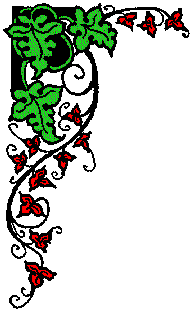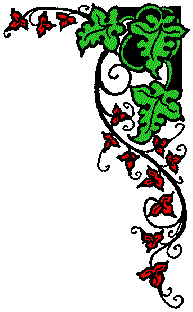

Sir Gawain and the Green Knight (ca. 1375-1400)


Sir Gawain and the Green Knight (ca. 1375-1400)
lines 491-565
![]()
![]() ir Gawain and
the Green Knight is the greatest 14th century text. The poem is made
up of two stories, one (the testing at Bercilak's castle) set inside the
other (the beheading of the Green Knight at the beginning and the return
blow at the end). The unknown author describes in the poem adventure of
the brave and courageous Sir Gawain who challenges the Green Knight.
ir Gawain and
the Green Knight is the greatest 14th century text. The poem is made
up of two stories, one (the testing at Bercilak's castle) set inside the
other (the beheading of the Green Knight at the beginning and the return
blow at the end). The unknown author describes in the poem adventure of
the brave and courageous Sir Gawain who challenges the Green Knight.
The passage that starts Part II of the poem illustrates the feast given to honor Sir Gawain for his bravery and courage after he meets the first challenge of the Green Knight. All knights present at the Round Table celebrate this great event and have a lot of fun after drinking: "Gawain was glad to begin those games in hall, /But if the end be harsher, hold it no wonder, /For though men are merry in mind after much drink" (Norton, p. 212).
Furthermore, the author continues the poem by describing the seasons of the year that follow the Christmas celebration: "And so this Yule to the young year yielded place" (Norton, 212). The author clearly relates to the Christian traditions in the text. After Christmas comes, the time of Lent, a period of penance when people fast and get ready for the Easter holidays. This is also the time when everything becomes alive. Many animals wake up from the winter rest and all the plants become green.
The unknown author creates for the reader a calm and easy mood while describing the seasons of spring and summer. Yet, by mentioning the green color of all plants, he reminds us about still-existing Green Knight who waits for Sir Gawain to come: "The ground and the groves wear gowns of green..." , "Glad is the green plant growing abroad, [...]" , "And the grass turns to gray, that once grew green" (Norton, 212, 213). With fall comes death, and the author tries to emphasize the fall of the Green Knight again, through the changing of the seasons
The Author illustrates Gawain's bravery. Sir Gawain is ready to leave to search for the Green Knight. He could have simply left Camelot and never returned. However, he chooses the option of keeping his word and searching for the Green Knight even though he knows that his head will be on the block when he reaches his goal. The passage ends with famous Sir Gawain's heroic words: "In destinies sad or merry, / True men can but try" (Norton, 214)
![]()
Other helpful links to pages about Sir Gawain and the Green Knight
Send any comments to Robert Bartusik.